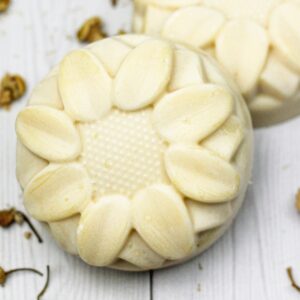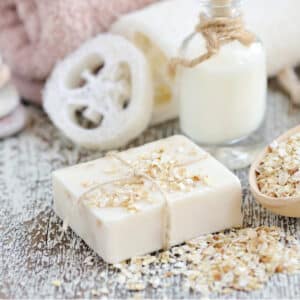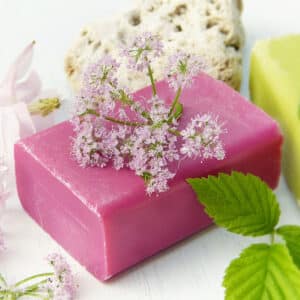Homemade soap has many amazing benefits for your skin and the planet. But unfortunately it can also contribute to problems with your plumbing system. Learn what can cause clogged drains and how to avoid it from happening.
Learn how to make homemade soap step by step.

Homemade soap, particularly bar soap, can potentially clog drains. This is because homemade soap is made of natural oils/fats which can clog pipes and bathroom sink drains.
Why does soap clog drains?
Solid or bar soap has a tendency to re-solidify once it gets flushed down the drain. Bits of soap and soap scum will eventually accumulate and create a slow drain or blockage.
Compared to commercial soap, homemade soap has a higher concentration of fatty acids and glycerin. When homemade soap comes into contact with water, the fatty acids and glycerin can react with minerals in the water. Which will form a solid material that can stick to the inside of pipes and drains. This material can build up over time, reducing the flow of water and eventually leading to blockages in the drain.
Additionally, homemade soap may contain other natural ingredients, such as herbs or flowers, which can also contribute to drain clogs. These ingredients can become lodged in pipes and drains and accumulate over time.
What is soap scum?
Soap scum is a white, chalky residue that can build up on surfaces such as showers, bathtubs, sinks, and tiles. It is caused by the reaction between hard water minerals and the soap or detergent that is used for cleaning.
While soap scum can build up on surfaces such as showers, bathtubs, and sinks, it typically doesn't directly cause drain clogs. However, if soap scum is allowed to accumulate over time, it can trap other materials such as long hair and dirt, which can lead to drain clogs.
The main cause of drain clogs is the buildup of materials such as hair, food particles, and grease, which can accumulate in pipes and trap other debris, eventually leading to a blockage. Soap scum can contribute to this process by sticking to other materials and making it easier for them to become trapped in the drain.
Therefore, while soap scum itself may not directly clog drains, it is still important to regularly clean and remove it from surfaces in order to prevent it from contributing to the buildup of materials that can lead to clogs. This can be done using a cleaner specifically designed to remove soap scum, or a mixture of vinegar and water. Additionally, using a squeegee or paper towel to wipe down surfaces after each use can help prevent water from sitting on surfaces and contributing to soap scum buildup.

How to prevent homemade soap from clogging drain lines
- Use a well draining soap dish to allow the soap to fully dry between uses. This can prevent the buildup of excess soap residue, which can contribute to clogs.
- Avoid using soaps that have a lot of dried flowers/ herbs/ coffee grounds etc. in them.
- Avoid flushing any clumps of soap down the drain pipes and instead dispose of it in the trash.
- Invest in a hair basket.
- Maintain clean drains by using a homemade drain cleaner (described below) or drain snake.
- Invest in a water softener.
- If you're a soapmaker try lowering the superfat you use in your soap formula to 3%. Consider adding a chelating agent, like Tetrasodium EDTA in your formula.
- Try switching to liquid soap.
How to unclog bathroom drains?
Here are several ways to clear a clogged drain, depending on the severity and location of the blockage:
- Boiling water: This is the simplest and often the best way for clearing minor clogs. Simply boil a pot of water and pour it down the drain in 2-3 stages, giving the water time to work between each pour. Be careful not to use boiling water on plastic pipes, as it can cause them to warp or melt.
- Baking soda and vinegar: This method can be effective for mild to moderate clogs. Start by pouring a cup of baking soda down the drain, followed by a cup of white vinegar. The mixture will foam up and work to break down the clog. Wait a few minutes, then pour boiling water down the drain to flush out the debris.
- Plunger: A plunger can be effective for clearing clogs in toilets, sinks, and showers. Make sure there is enough water in the sink or toilet to cover the plunger head, and create a tight seal around the drain. Pump the plunger up and down vigorously to create pressure and suction that can help break up and move the clog.
- Drain snake (drain auger): A drain snake, also known as a plumbing auger, can be used to clear more stubborn clogs. Insert the snake into the drain and rotate the handle to break up the blockage. When you feel resistance, turn the handle in the opposite direction to retract the snake, pulling out the debris.
- Chemical drain cleaners: Chemical cleaners can be effective for clearing tough clogs, but they should be used with caution and only as a last resort. These cleaners contain harsh chemicals that can damage pipes and harm the environment, so be sure to follow the instructions carefully and use protective gloves and eyewear.
If these methods don't work, it may be necessary to call a professional plumber to clear the blockage using more advanced tools and techniques.
Conclusion
Homemade bar soap can cause clogs in your bathroom or sink drain. The good news is that there are a few simple steps you can take to avoid a clogged shower drain. If you make your own homemade soap you can tweak your recipe to prevent clogging. If plumbing problems persist it might be a good idea to switch to liquid soap instead.






Leave a Reply